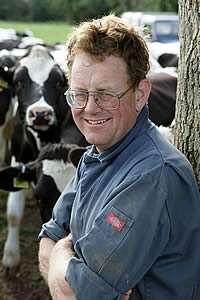 |
|||||||||
|
|||||||||||||||||||
Gold Cup finalist 2005, Stephen Bendall
Individual cow management and progressive business plans have earned Stephen Bendall, from Marksbury near Bath, a finalist place in the 2005 NMR/ RABDF Gold Cup - the industries most prestigious award. The Pensdown herd of 145 pedigree Holstein Friesians at New Farm are high yielders and rank in NMR' s top 1% for production. But to become one of the Gold Cup's final six Stephen has had to demonstrate the all round success of the business. Stephen works with father John and brother Andrew, who looks after the arable business, and herdsman Gavin Taylor on the 170-hectare Duchy of Cornwall farm. His dairy unit fits in well with the philosophy of the competition that spotlights herd performance and farm management, environment policies and future planning strategies. Cow performance has been steadily improving and average yields are now at 10,450 kg per cow at 3.8% fat and 3.19% protein, with a margin over purchased feed of £1,335. "I manage cows to meet expectations and aim to take the variables out," says Stephen. "This means rationing very carefully to make sure that cows reach their targets and making sure that they get back in calf with in our time scale. Its really important that we balance the TMR so we analyse forage to check its quality throughout the year." Calving is two thirds autumn and a third spring and as cows calve they are put into groups - the milking herd falls into four groups of about 36 cows each. Grass and maize silage is mixed with straights in the TMR and cows are flat rate fed with an 18% protein cake in the parlour. Immediately post calving cows are fed for 45 litres, then 200 days into their lactation the quantity of feed, rather than the formulation, is cut. "So instead of feeding 36 cows, I will put the amount of feed out for say 27, depending on the group's average yield. The ration will be the same," says Stephen. "I think this prevents over feeding and I find that cows are well prepared for the subsequent lactation. We will vary amounts if the cows are out at grass, but it is difficult to ensure that dry matter intakes are high enough if we rely too much on grazing." For this reason, spring calvers are housed to maintain yields. "I think that cows have too big a nutritional requirement to graze efficiently at this stage. They need 23kg of dry matter if they are out at grass they can't physically take this on board," he adds. "As a result, yields drop." More emphasis has been placed on longevity in recent years. "I want to combine high production with longevity and look for an average of five lactations form each cow - well above the national average. "I don't wholly rely on breeding to do this - I believe it's more of a management issue. Cubicles have to be clean, long and not too wide to prevent disease and lameness. The cow also needs good nutrition for production, health and fertility and as a routine we trim all feet twice a year and each day they walk through a foot bath. All these measures help to keep the cow fit and well." Looking ahead, with the possibility of nephew Richard joining the business, cow numbers may need to be increased to 250. These will hopefully be homebred. Further ahead, Stephen, doesn't rule out contracting out heifer rearing. Although no simple challenge, Stephen Bendall keeps herd performance on target and reduces the variables in the business as far as possible. "What is far more variable is the political situation, we have to look to our own business for solutions - this is the biggest challenge," he adds. "We are responding to the SFP and are applying for the entry level stewardship scheme as the farm is virtually at the required points level already- these include enough hedges and buffer strips along a stream running through the farm, together with over wintered stubble and some wild flower mixtures." Despite being disappointed by the continued low milk prices, the Bendalls see a ray of hope for the industry in the future for partnership deals like the ASDA and Arla supply contract that demonstrates more transparent costings. "Hopefully, through Arla, we can have some input with a firm like ASDA," adds Stephen. "Then we can move forward together - I believe that this is the future, rather than keep switching buyers or selling up and getting out of milk altogether, which is something I hope I won't have to contemplate.” |
|||||||||||||||||||

|
|
||||||||||||||||||
| home | agri-services | pedigree
pen | news | dairy | beef | machinery bps | property | organisations | site map |
|||||||||||||||||||

